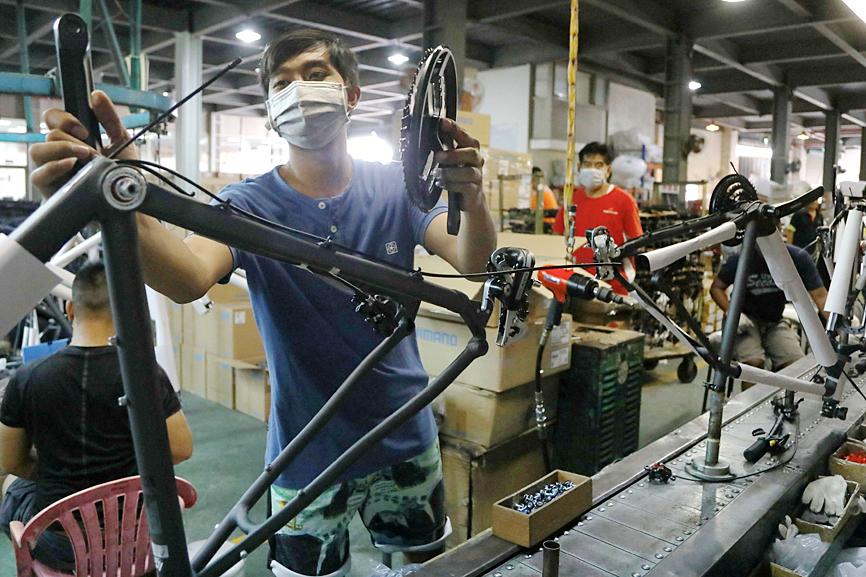Business sentiment among local firms last month diverged as manufacturers expressed confidence concerning their outlook, but service providers and construction firms turned neutral with a conservative tendency, a survey published by the Taiwan Institute of Economic Research (台灣經濟研究院) found.
The sentiment gauge for the manufacturing industry was 101.27 last month, up 0.81 points from a revised 100.46 in September, increasing for six months in a row to the highest level since August 2018.
Manufacturers with positive views about business prospects increased 7.5 percentage points to 25.6 percent, while companies with a negative outlook dropped 3.6 percentage points to 21.3 percent, the monthly survey published yesterday showed.

Photo: Ann Wang, Reuters
Suppliers of chemical and steel products are more optimistic than their peers in other sectors, benefiting from infrastructure construction projects, the institute’s economic forecasting center director Gordon Sun (孫明德) said.
Most manufacturers have neutral views about business in coming months after European countries tightened social distancing and travel restrictions to rein in increasing numbers of COVID-19 infections, it said.
The current quarter is high season for technology products for which local firms supply critical components, but business has been undercut by China’s Huawei Technologies Co’s (華為) inventory stockpiling ahead of an import ban imposed by the US that took effect on Sept. 15.
The sentiment reading for service providers last month fell 0.46 points to 96.8, ending six straight months of upturn, the institute said.
Restaurants and life insurance firms grew increasingly uncertain about the landscape ahead, it found, as large technology firms canceled year-end banquets to curb COVID-19 infection risks.
Hospitality providers expected corporate banquet demand to slump 30 percent this year from last year, although technology firms reported a boom in business from remote working and education, the institute said.
Meanwhile, border controls continue to weigh on hotels that depend heavily on foreign business travelers, it said.
The sentiment score for civil engineering firms, property developers and brokers slipped 0.02 points to 111.17, the survey found, after government agencies voiced concern about property price hikes.
More than 50 percent of builders turned from being sanguine to neutral after the Ministry of the Interior announced plans to crack down on speculation of presale projects and a central bank warning about loose land financing and mortgage operations, the institute said.
The Financial Supervisory Commission on Friday last week lent support, saying that it is to inspect local banks’ real-estate lending businesses.

In Italy’s storied gold-making hubs, jewelers are reworking their designs to trim gold content as they race to blunt the effect of record prices and appeal to shoppers watching their budgets. Gold prices hit a record high on Thursday, surging near US$5,600 an ounce, more than double a year ago as geopolitical concerns and jitters over trade pushed investors toward the safe-haven asset. The rally is putting undue pressure on small artisans as they face mounting demands from customers, including international brands, to produce cheaper items, from signature pieces to wedding rings, according to interviews with four independent jewelers in Italy’s main

Japanese Prime Minister Sanae Takaichi has talked up the benefits of a weaker yen in a campaign speech, adopting a tone at odds with her finance ministry, which has refused to rule out any options to counter excessive foreign exchange volatility. Takaichi later softened her stance, saying she did not have a preference for the yen’s direction. “People say the weak yen is bad right now, but for export industries, it’s a major opportunity,” Takaichi said on Saturday at a rally for Liberal Democratic Party candidate Daishiro Yamagiwa in Kanagawa Prefecture ahead of a snap election on Sunday. “Whether it’s selling food or

CONCERNS: Tech companies investing in AI businesses that purchase their products have raised questions among investors that they are artificially propping up demand Nvidia Corp chief executive officer Jensen Huang (黃仁勳) on Saturday said that the company would be participating in OpenAI’s latest funding round, describing it as potentially “the largest investment we’ve ever made.” “We will invest a great deal of money,” Huang told reporters while visiting Taipei. “I believe in OpenAI. The work that they do is incredible. They’re one of the most consequential companies of our time.” Huang did not say exactly how much Nvidia might contribute, but described the investment as “huge.” “Let Sam announce how much he’s going to raise — it’s for him to decide,” Huang said, referring to OpenAI

The global server market is expected to grow 12.8 percent annually this year, with artificial intelligence (AI) servers projected to account for 16.5 percent, driven by continued investment in AI infrastructure by major cloud service providers (CSPs), market researcher TrendForce Corp (集邦科技) said yesterday. Global AI server shipments this year are expected to increase 28 percent year-on-year to more than 2.7 million units, driven by sustained demand from CSPs and government sovereign cloud projects, TrendForce analyst Frank Kung (龔明德) told the Taipei Times. Demand for GPU-based AI servers, including Nvidia Corp’s GB and Vera Rubin rack systems, is expected to remain high,